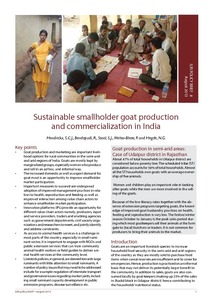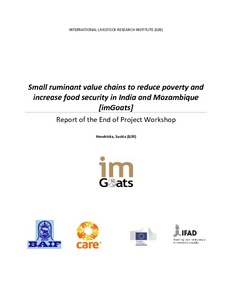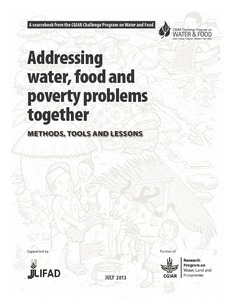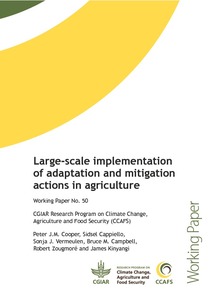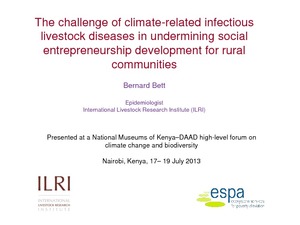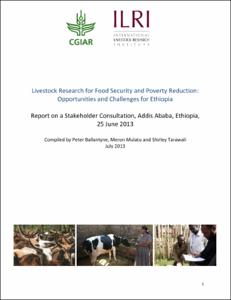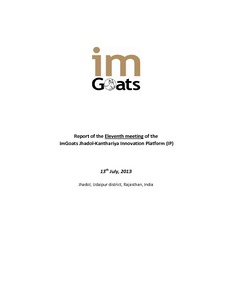Small ruminant value chains to reduce poverty and increase food security in India and Mozambique (imGoats): Report of the end of project workshop
Rangelands –sound management strategies for a vulnerable resource
Rangelands cover 30 per cent of the global land surface. They support a considerable share of the global ruminant value chains, are habitat for a high plant and animal diversity and have various ecological, economic and social functions. But rangelands are currently under pressure from global change processes. A focus on humananimal- environment interactions is necessary to avoid resource overexploitation and degradation.
Addressing water, food and poverty problems together--Methods, tools and lessons
This sourcebook entitled “Addressing water,food and poverty problems together: Methods,tools and lessons” is part of a wider process to capitalize on results from the Phase 1 of CPWF (2004-2008).
Phase 1 of CPWF cast its net widely. Sixty-eight individual research projects were carried out in ten river basins around the world. The learning was immense. Unfortunately, many Phase 1 lessons and experiences are locked away in people’s minds or hidden in long technical and scientific reports that are difficult to access, particularly for non-researchers.
Large-scale implementation of adaptation and mitigation actions in agriculture
This paper identifies sixteen cases of large-scale actions in the agriculture and forestry sectors that have adaptation and/or mitigation outcomes, and distils lessons from the cases. The cases cover policy and strategy development (including where climate-smart objectives were not the initial aim), climate risk management through insurance, weather information services and social protection, and agricultural initiatives that have a strong link to climate change adaptation and mitigation.
Key lessons learned include:
Creating Policy Space for Pastoralism in Kenya
Paper reflects on the work of the Ministry of State for Development of Northern Kenya and other Arid Lands between its formation in April 2008 and the elections of March 2013. Begins by summarising the historical, political and institutional contexts within which the Ministry was created, as well as the multiple narratives that have driven policy in Kenya’s drylands over time. Explains some of the policy choices the Ministry made in interpreting its mandate and shaping the policy agenda.
Efecto de la exclusión del pastoreo en la composición florística, producción de pastos y parámetros edáficos, en minas de carbón restauradas en el norte de España
Aunque el efecto del pastoreo en los ecosistemas ha sido ampliamente estudiado, muchos de los resultados a menudo resultan contradictorios. Esta ambigüedad es debida en parte a la capacidad de los herbívoros para dar forma a los sistemas naturales, favoreciendo a especies particulares de plantas o ejerciendo un efecto negativo o indiferente sobre otras.
The challenge of climate-related infectious livestock diseases in undermining social entrepreneurship development for rural communities
Livestock research for food security and poverty reduction: Opportunities and challenges for Ethiopia - Report on a stakeholder consultation, Addis Ababa, Ethiopia, 25 June 2013
Report of the eleventh meeting of the imGoats Jhadol-Kanthariya innovation platform, 11 July 2013
Operationalizing inclusive innovation: Lessons from innovation platforms in livestock value chains in India and Mozambique
Various authors have identified the potential relevance of innovation system approaches for inclusive innovation, i.e. the means by which new goods and services are developed for and by the poor. However, it is still a question how best to operationalize this. Innovation platforms are a way of operationalizing interaction and learning among actors, and enable reshaping of relations and institutions.

